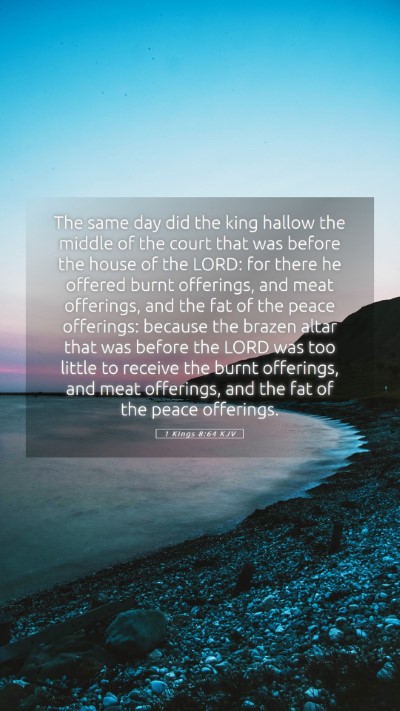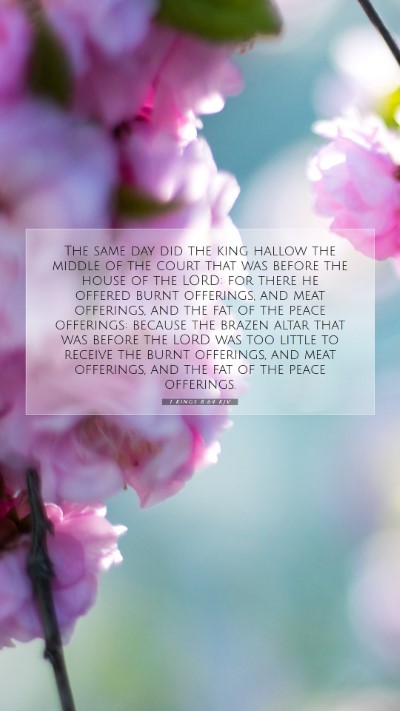Understanding 1 Kings 8:64
Bible Verse: 1 Kings 8:64 - "On that day the king consecrated the middle of the court that was in front of the house of the LORD, for there he offered the burnt offerings and the grain offerings and the fat of the peace offerings, because the bronze altar that was before the LORD was too small to receive the burnt offerings and the grain offerings and the fat of the peace offerings."
Summary of Biblical Exegesis
This verse occurs in the context of Solomon’s dedication of the temple, marking a significant moment in the history of Israel. The verse illustrates the devotion and reverence Solomon had for God as he led the nation in worship. It reveals the importance of the sacrifices offered and highlights the physical space designated for worship.
Insights from Public Domain Commentaries
-
Matthew Henry:
Matthew Henry points out that during this dedication, Solomon displayed the glory of the Lord that filled the temple. The act of consecrating the altar and offering sacrifices reflects the acknowledgment of God’s presence among His people. Henry emphasizes the necessity of proper worship practices, demonstrating that the quality of offerings matters significantly as they were expressions of gratitude and devotion.
-
Albert Barnes:
Albert Barnes notes the significance of the location chosen for making the offerings. The bronze altar was a vital part of the temple's architecture and design, symbolizing Christ’s ultimate sacrifice. His commentary stresses the transition within the sacrificial system signified by the construction of the temple and how it represented God's dwelling among His people. Barnes also connects the excessive offerings to the realization of the grace found in God through Christ.
-
Adam Clarke:
Adam Clarke highlights the abundance of sacrifices offered by Solomon, describing it as an overflow of devotion and worship. He explains that the offerings included various types of animals, each representing different expressions of reverence and communion with God. Clarke notes that Solomon's actions demonstrate the need for corporate worship to unite the nation in their relationship to God, focusing on the covenantal aspect of their faith.
Significance of the Verse
This verse is crucial for understanding the dedication of the temple and the nature of worship in ancient Israel. It reflects several themes:
-
The Nature of Worship:
The proper worship entails the offering of sacrifices and understanding their significance. Solomon’s actions illustrate a formal and sacred approach to worship that is vital for any Bible verse interpretation.
-
Covenantal Relationship:
Worship and sacrifices signify the deep relationship between God and His people, emphasizing their continual need for atonement and gratitude. As the Church today, this relationship remains foundational to understanding Scripture.
-
Divine Presence:
The filling of the temple with God's glory signifies His acceptance of Solomon’s offerings and confirms His presence among His people, an essential aspect of biblical commentary.
Application of the Verse in Daily Life
Understanding 1 Kings 8:64 can enhance personal and communal worship experiences. Here are some practical applications:
- Reflect on the nature of your offerings—both material and spiritual—and strive to ensure they come from a place of genuine gratitude and love.
- Recognize the importance of community in worship; church gatherings should mimic the unification seen in the temple dedication.
- Make room for the presence of God in your life through prayer, worship, and sacrifices of time, talent, and treasure.
Cross References
- 2 Chronicles 7:5: Details the offerings made during the temple dedication.
- Hebrews 9:12: Connects the Old Testament sacrifices with the ultimate sacrifice of Christ.
- Exodus 40:34-35: Discusses the glory of the Lord filling the tabernacle.
Conclusion
In summary, 1 Kings 8:64 encapsulates a moment of profound significance in Israel’s history concerning worship and God’s presence. Interpreting this verse involves understanding its religious, historical, and spiritual contexts. The reflections provided through various commentaries enrich its meaning, allowing for a deeper appreciation of worship and our relationship with God.


